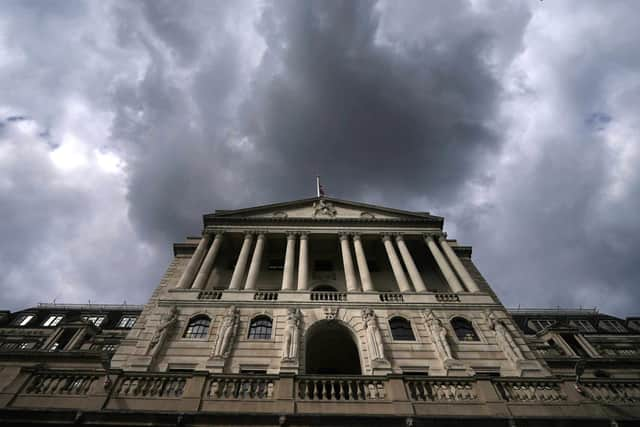Inflation ups and downs: Why borrowers face a summer of pain despite cooling prices
Inflation may be heading in the right direction but those banking on an early cut in interest rates shouldn’t hold their breath.
Cooling food prices helped push the consumer prices index (CPI) measure of inflation down to an annualised rate of 3.2 per cent in March, from 3.4 per cent in February, according to the latest official figures. That sees the UK with a lower rate than the US for the first time in two years, having peaked at 11.1 per cent in autumn 2022.
Advertisement
Hide AdAdvertisement
Hide AdLast month’s easing in the headline rate was heavily linked to a slowdown in food price inflation, which was at its lowest for more than two years. But while it may be another step in the right direction, the 3.2 per cent reading came in slightly ahead of the 3.1 per cent economists had predicted, disappointing those expecting an earlier-than-forecast interest rate cut from the Bank of England.


Analysts expect data for April to show a further fall in inflation, supported by another drop in energy prices, as CPI moves closer towards the central bank’s 2 per cent target rate. This has increased speculation that the bank could trim borrowing costs before the summer, although governor Andrew Bailey and other members of the bank’s monetary policy committee (MPC) have so far suggested it is too early for a cut.
Susannah Streeter, head of money and markets at investment platform Hargreaves Lansdown, said: “Although consumer prices are heading in the right direction, it’s not just the headline rate which determines Bank of England action. Policymakers scan other data, and the snapshot of stubborn wage growth out this week continues to be a concern.
“Unemployment may have risen, but the labour market figures are considered unreliable, and more people out of work isn’t yet translating into a sharp slowdown in wage increases, as there’s still a fight for talent in big pockets of the economy.
“Although core inflation, which strips out volatile food and fuel prices is also cooling, slowing to 4.2 per cent, the worry is that employers could pass on higher wage bills in the form of higher prices in the months to come. It means the interest rate may stay at a painful level for even longer than earlier forecasts, with August or September being increasingly pencilled in.”


Business leaders will be hoping that the bank acts sooner as casualties continue to pile up, particularly in the retail and hospitality sectors. Tina McKenzie, policy chair at the Federation of Small Businesses (FSB), which represents thousands of small and medium-sized enterprises (SMEs), welcomed news of the further fall in inflation but said business owners “know all too well that they can never be complacent”.
She added: “Small firms will now turn their eyes and their hopes to the Bank of England, and will hope that the base rate cut many have been eagerly awaiting arrives sooner rather than later. We don’t want to risk stifling the small upward movement in GDP recorded in the first two months of this year.”
Roger Barker, director of policy at the Institute of Directors, said: “There is still some way to go before inflationary pressures are squeezed out of some sectors of the economy. Nonetheless, the trend is clear and the case for a cut in the bank rate by the Bank of England at the next meeting of the monetary policy committee on May 9 remains intact.”
Advertisement
Hide AdAdvertisement
Hide AdInflation for food and non-alcoholic drinks dipped to 4 per cent for March, from 5 per cent in February, to reach its lowest level since November 2021. The increased slowdown was partly driven by a fall in meat prices and lower rises for bread and cereals, the Office for National Statistics (ONS) said.
Furniture and household goods prices also contributed to the fall, with prices in the sector down 0.9 per cent in March compared with the same month last year. Elsewhere in retail, clothing and footwear inflation slowed to 4 per cent for the month, from 5 per cent in February, after women’s clothing stores increased prices by less than normal for this time of year.
The largest upward pressure came from motor fuels, after the average price of petrol rose by 2.6p per litre between February and March to stand at 144.8p per litre, according to the ONS.
The overall reduction in inflation comes after a series of interest rate hikes from the Bank of England, which have pushed the bank base rate to a 15-year-high of 5.25 per cent.
Danni Hewson, head of financial analysis at investment firm AJ Bell, noted: “Inflation is moving in the right direction and anyone who has wheeled a trolley around a supermarket over the past few weeks will have noticed that prices aren’t delivering those checkout shocks in the same way they were this time last year. Next month should look even better as the falling energy price cap is finally counted in the numbers.
“This is unlikely to persuade Bank of England policymakers, who just a couple of months ago were voting for further hikes, that the time is now right to start to cut. Andrew Bailey might be making positive noises about the pieces of the economic puzzle falling into place for a change in policy, but markets are far from convinced. Looking at the numbers after the inflation [data] was released, expectation of a June cut has fallen back significantly and more than 50 per cent now think even August will be too soon.”
The next MPC meetings take place on May 9, June 20, August 1 and September 19.
Comments
Want to join the conversation? Please or to comment on this article.